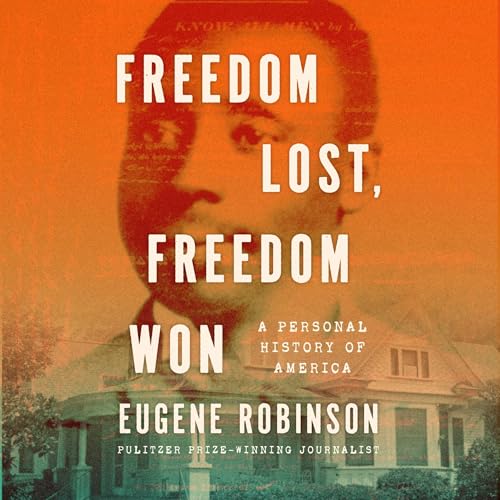
Freedom Lost, Freedom Won
A Personal History of America
Échec de l'ajout au panier.
Veuillez réessayer plus tard
Échec de l'ajout à la liste d'envies.
Veuillez réessayer plus tard
Échec de la suppression de la liste d’envies.
Veuillez réessayer plus tard
Échec du suivi du balado
Ne plus suivre le balado a échoué
0,00 $ pour vos 30 premiers jours
OFFRE D'UNE DURÉE LIMITÉE
0,99 $/mois pendant vos 3 premiers mois
L'offre prend fin de 29 janvier 2026 à 23 h 59, HP.
Vos 3 premiers mois d'Audible à seulement 0,99 $/mois
1 nouveauté ou titre populaire à choisir chaque mois – ce titre vous appartiendra.
L'écoute illimitée des milliers de livres audio, de balados et de titres originaux inclus.
L'abonnement se renouvelle automatiquement au tarif de 0,99 $/mois pendant 3 mois, et au tarif de 14,95 $/mois ensuite. Annulation possible à tout moment.
Choisissez 1 livre audio par mois dans notre incomparable catalogue.
Écoutez à volonté des milliers de livres audio, de livres originaux et de balados.
L'abonnement Premium Plus se renouvelle automatiquement au tarif de 14,95 $/mois + taxes applicables après 30 jours. Annulation possible à tout moment.
Précommander pour 26,99 $
-
Narrateur(s):
-
Eugene Robinson
-
Auteur(s):
-
Eugene Robinson
À propos de cet audio
On March 27, 1829, a wealthy white planter and entrepreneur named Richard Fordham purchased four enslaved African Americans from a woman named Isabella Perman. One of them was journalist Eugene Robinson’s great-great-grandfather, a boy called Harry.
Starting from this transaction, which took place in Charleston, South Carolina, Freedom Lost, Freedom Won brings to life 200 years of our nation’s history through the eyes of the remarkable family that Harry founded. Assigned a formal name—Henry Fordham—and put to work as a blacksmith, he achieved his own freedom a decade before the Civil War. He was there when victorious Union troops marched into Charleston in 1865, ending slavery and guaranteeing liberty for Black people—only on paper, though, and only for a time.
Robinson traces the arc of his familial lineage through the repeated cycles in which African Americans have fought their way upward toward freedom and opportunity, been forced back down again, and renewed their determined climb.
From his great-great-grandfather’s achievement in becoming a “free person of color” before emancipation to his great-grandfather’s Reconstruction-era success, from his father’s odyssey of the Great Migration to his own coming-of-age during the civil rights movement, Robinson delves into a rich archive of Black narratives, arguing that we still have a long way to go before it is possible to speak of a “post-racial America.”
Setting his extensive research within the larger historical context, Robinson provides both an indictment of structural racism and an illustration of how it has been fought and, at times, courageously overcome. Freedom Lost, Freedom Won tells our country’s tortuous racial history through Robinson’s family’s story of struggle and survival, pushing us to consider how far the nation has come—willingly or not—and how far it still has to go.
Pas encore de commentaire


